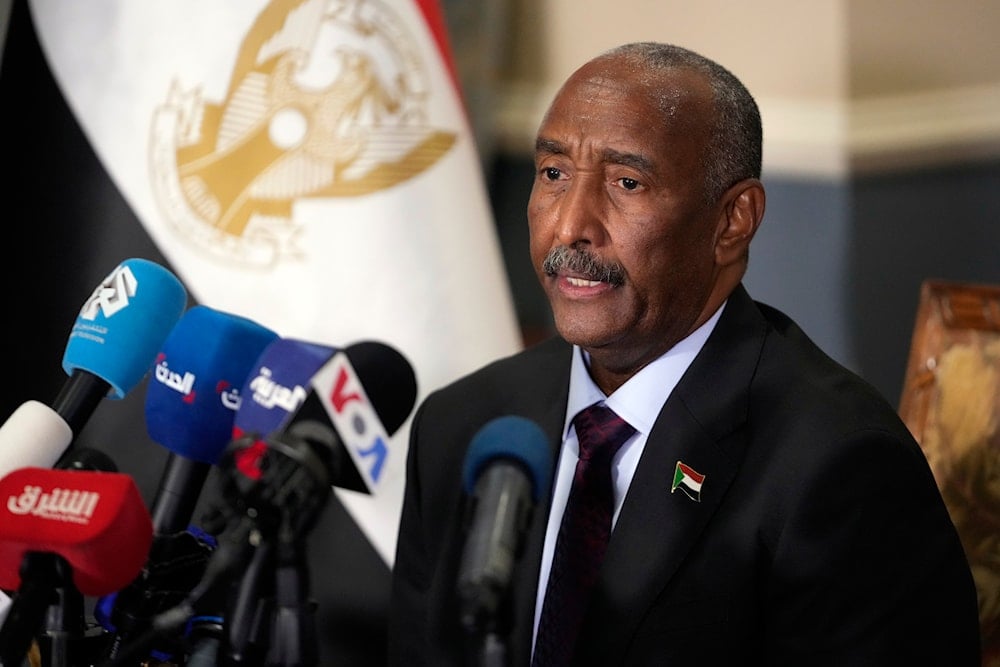Sudanese security council reviewing US proposal for temporary truce
Sudan's Security and Defense Council says it will review a US ceasefire proposal as the RSF advances in Darfur, capturing El Fasher and threatening Kordofan.
-

Gen. Abdel Fattah al-Burhan, president of the Transitional Sovereign Council of Sudan, speaks during a news conference at the Sudan Mission to the United Nations, Thursday, Sept. 26, 2024, in New York (AP)
Sudan’s Security and Defense Council, chaired by the head of the Transitional Sovereignty Council and army chief Abdel Fattah al-Burhan, is set to discuss a ceasefire proposal put forward by the United States aimed at ending the conflict in Sudan, according to an unnamed government source cited by AFP.
The decision comes as the Rapid Support Forces prepare for a possible offensive in Kordofan after seizing control of El Fasher, the army’s last stronghold in Darfur, nearly two weeks ago.
AFP quoted a government source, who requested anonymity, as saying, “The Security and Defense Council will hold a meeting on Tuesday to discuss the US ceasefire proposal."
However, soon after, Sudan's defense minister, Hassan Daoud Kayan, said that the army would continue fighting the paramilitary Rapid Support Force.
"We thank the Trump administration for its efforts and proposals to achieve peace," the defense minister said in a speech broadcast on state television, adding, "Preparations for the Sudanese people's battle are ongoing."
Truce in Sudan
In a related development, US Special Envoy for Africa and Senior Advisor for Arab and African Affairs, Massad Boulos, held a series of meetings in the Egyptian capital, Cairo, over the past few days to finalize the details of the humanitarian ceasefire proposal first introduced in mid-September, with the backing of several mediators, including Egypt, Saudi Arabia, and the United Arab Emirates.
Boulos affirmed that “the United States is working to reach a humanitarian ceasefire agreement in Sudan lasting three months, with the possibility of extending it to nine months,” noting that “talks with both sides of the conflict are showing significant progress despite the complex situation on the ground.”
He pointed out that “the proposed truce announced by the International Quad on September 12 aims to allow humanitarian organizations to deliver food and medical aid to more than 25 million Sudanese in urgent need of assistance,” stressing that “Sudan’s peace and territorial unity are a strategic priority for the United States, not only for the Sudanese people but also for the stability of the region and the Red Sea.”
Fears of Libyan-style scenario
The US envoy also noted that Trump views Sudan’s security and that of its neighbors as integral to both regional and global stability, adding that Washington will continue its efforts until a comprehensive and lasting ceasefire is achieved and normal life returns to Sudan. He additionally emphasized the importance of Sudanese unity around a national, homegrown initiative.
In response to a question about the possibility of Sudan descending into a Libyan-style scenario, Boulos stressed that “the United States completely rejects the idea of parallel governments,” saying, “We fear a repeat of the Libyan model following the Rapid Support Forces’ control over large parts of Darfur.”
He added that “a political solution remains the only path to Sudan’s stability,” emphasizing that Washington supports “Sudan’s unity and is working to prevent its slide into geographic or political division.”
Violence takes over El Fasher after RSF assault
El Fasher had been under a prolonged siege for more than a year, and over the last two weeks, the Rapid Support Forces launched a concentrated assault that culminated in the city’s fall after heavy urban fighting, ending the last significant army presence in North Darfur.
The fighting and takeover forced tens of thousands to flee in a matter of days, with UN agencies and media reporting large flows of people into nearby towns such as Tawila, as tens of thousands were displaced since the city’s fall.
Survivors and rights groups have described summary executions, kidnappings, and targeted killings during and after the assault, and videos and eyewitness testimony documented extrajudicial violence as hospitals, shelters, and civilian areas were struck or overrun.
Humanitarian responders warn of a catastrophic protection and relief gap: routes are blocked, supplies in the city have collapsed, clinics were attacked, and hundreds of thousands in the wider area face acute shortages as international bodies call for investigations and urgent access for aid.

 4 Min Read
4 Min Read








